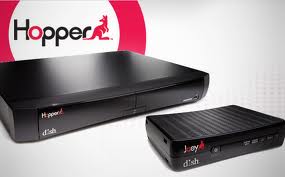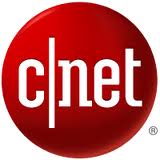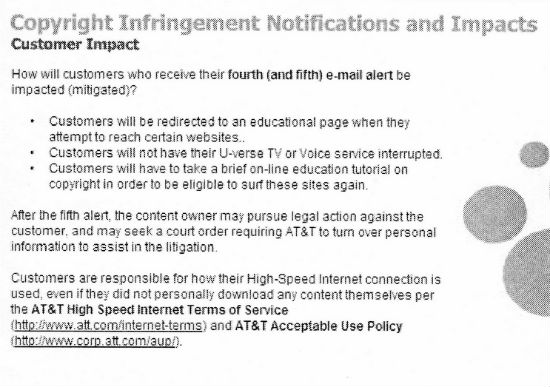 The entertainment industry, in cooperation with the nation’s largest Internet Service Providers, joined forces to open a new copyright enforcement center that critics charge sidesteps judicial process, leaving consumers forced to prove they are innocent after they’ve been accused of being guilty.
The entertainment industry, in cooperation with the nation’s largest Internet Service Providers, joined forces to open a new copyright enforcement center that critics charge sidesteps judicial process, leaving consumers forced to prove they are innocent after they’ve been accused of being guilty.
On Monday, the Center for Copyright Infringement named its executive director and board, and intends to gradually begin serving as a clearinghouse for copyright infringement complaints brought by the nation’s music and movie companies.
CCI has representatives from the Motion Picture Association of America (MPAA), the Recording Industry Association of America (RIAA), AT&T, Cablevision, Comcast, Time Warner Cable, and Verizon Communications collectively working to streamline enforcement of copyright law and control Internet piracy.
Often known as the “Six Strikes Plan,” CCI participants will coordinate piracy notification warnings for suspected illicit downloads of copyrighted content from peer-to-peer file sharing networks. Hollywood studios and recording labels will identify those they suspect are involved in illegal file swapping and participating ISPs will notify customers tied to the infringing IP addresses up to six times before reducing a customer’s Internet speed, temporarily disabling the account, or terminating service.
 The CCI hopes to bypass the court system and adopt a self-regulation, “in-house” approach to Internet piracy. Some courts have proven increasingly-reluctant to hand over identifying information to copyright holders based on the sometimes-flimsy evidence of illegal downloading included in supporting affidavits. Judges in some courts have also become leery of a cottage industry of “settlement specialists” that threaten expensive litigation for alleged copyright infringement that can be resolved with a quick cash settlement.
The CCI hopes to bypass the court system and adopt a self-regulation, “in-house” approach to Internet piracy. Some courts have proven increasingly-reluctant to hand over identifying information to copyright holders based on the sometimes-flimsy evidence of illegal downloading included in supporting affidavits. Judges in some courts have also become leery of a cottage industry of “settlement specialists” that threaten expensive litigation for alleged copyright infringement that can be resolved with a quick cash settlement.
Judge James F. Holderman of the Northern District of Illinois ruled against one litigant who demanded ISPs divulge the identities of every participant exchanging bits and pieces of a copyrighted work in a so-called “BitTorrent swarm,” because they were involved in a conspiracy. Holderman dismissed that argument.
Such tactics have allowed some settlement specialists to demand settlement payments from a larger group, substantially boosting revenue at little cost to them.
CCI’s executive director Jill Lesser says laws no longer favor copyright holders.
“While laws that protect intellectual property remain strong and enforcement efforts continue, technology has tipped the balance away from the interests of most creators and artists,” Lesser said. “The ease of distribution of copyrighted content has helped create a generation of people who believe that all content should be free.”
 CCI’s so-called “Copyright Control System” will bypass the courts entirely, as entertainment companies coordinate directly with major ISPs agreeing to enforce copyright compliance.
CCI’s so-called “Copyright Control System” will bypass the courts entirely, as entertainment companies coordinate directly with major ISPs agreeing to enforce copyright compliance.
Lesser says consumers will still have a fair process to challenge notices of alleged infringement. But it will cost at least $35 for consumers to argue their case. Additionally, as a self-regulated, industry-controlled body, consumers’ rights of appeal are undetermined. The arbitration process will be administered through the American Arbitration Association.
Why would ISPs want to become involved in a copyright control regime? To reduce their own expenses and legal risks. Copyright holders and their agents have peppered service providers with compliance and identification demands for years, creating full time positions processing the paperwork. By adopting a clearinghouse and developing a streamlined process to handle complaints, service providers can cut costs and avoid possible litigation against themselves.
Still, both the entertainment industry and ISPs seem to be open to listening to consumer advocates. Lesser was formerly involved with People for the American Way, a group sensitive to privacy rights. Serving on the advisory board are Gigi Sohn from Public Knowledge and Jerry Berman, founder of the Center for Democracy and Technology. Neither have direct authority over the group’s enforcement efforts, but Sohn told Ars Technica she hoped her involvement would give a voice to consumer interests and maintain transparency in the enforcement process.
 The Digital Millennium Copyright Act strikes again.
The Digital Millennium Copyright Act strikes again.

 Subscribe
Subscribe CNET was forced to withdraw a planned award for Dish Network’s ad-skipping “Hopper” DVR because the website’s owner, CBS, is suing the satellite dish company over the device.
CNET was forced to withdraw a planned award for Dish Network’s ad-skipping “Hopper” DVR because the website’s owner, CBS, is suing the satellite dish company over the device. The Verge added there was clear evidence of a growing influence on the editorial decisions at the digital news subsidiaries owned by CBS, all designed to protect the parent company.
The Verge added there was clear evidence of a growing influence on the editorial decisions at the digital news subsidiaries owned by CBS, all designed to protect the parent company.







